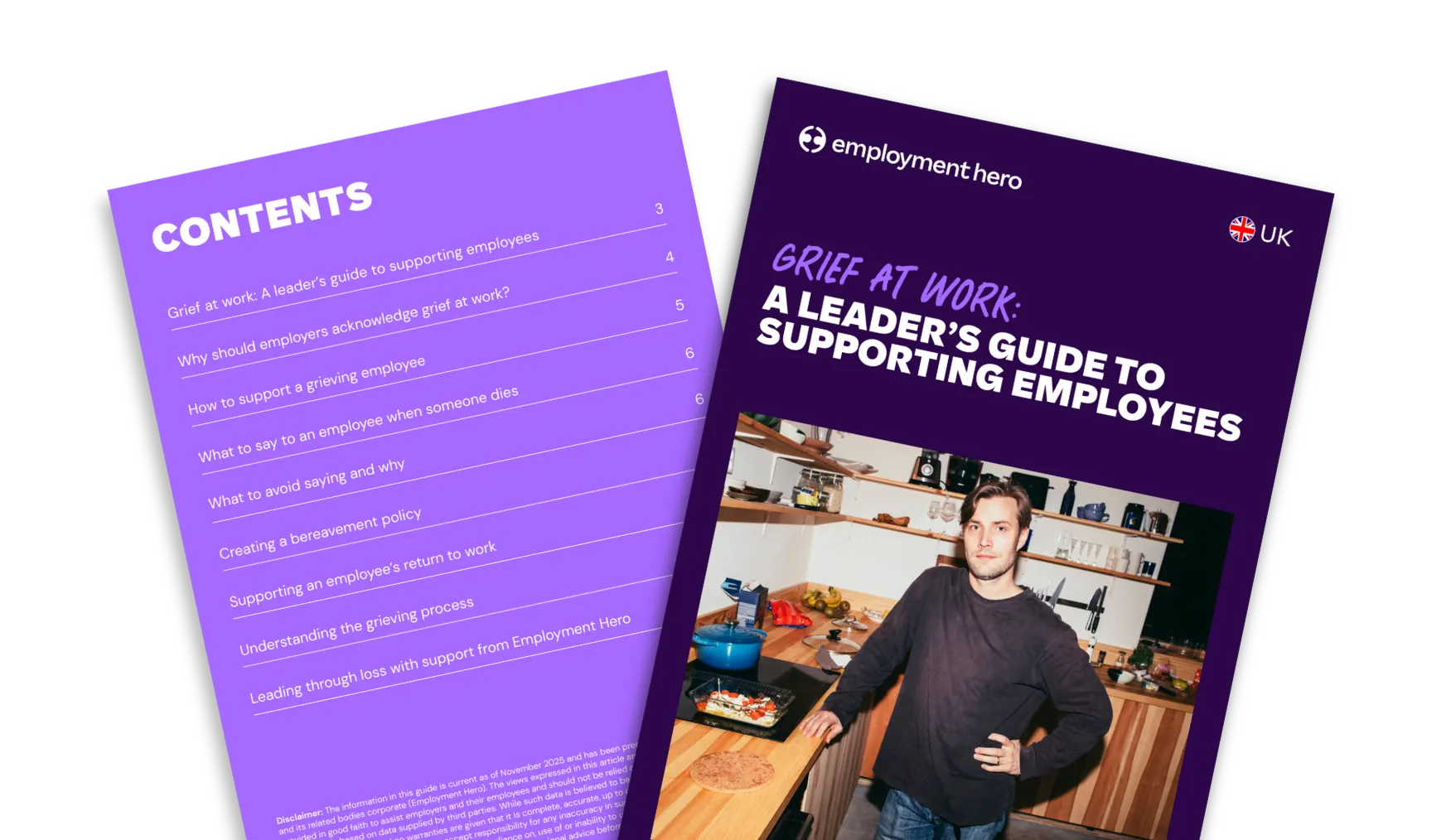How to easily calculate 52 week average for holiday pay

Contents
Managing employee holiday pay calculations is a key responsibility for any business and an important one to get right. It’s relatively straightforward for employees on fixed hours and salaries, but can be a bit more complicated for staff on irregular hours or fluctuating earnings.
We’re here to bring you the information you need to successfully manage employee pay calculations as part of your payroll.
How much annual leave are employees entitled to?
In the UK, workers are legally entitled to 5.6 weeks (28 days) of paid holiday every year. This applies to everyone, including part-time workers, though the amount of annual leave they actually get is proportionate to the number of days worked.
If an employee works irregular hours or doesn’t work for certain periods in the year, they’re still entitled to these 5.6 weeks, but they’ll accrue their days off pro rata as they work.
Employers are legally obligated to provide the minimum statutory annual leave, but they can choose to provide extra paid leave if they wish. Increasing holiday entitlement is a great reward for loyal employees, giving extra days for hitting certain milestones or lengths of service.
Holiday pay for full-time employees
Calculating holiday pay for full-time, fixed-hours employees is simple. Their salary is the same each month and won’t change when they take annual leave throughout the year.
They’ll be entitled to the full 28 days of statutory holiday, plus any extra days you’ve awarded over their employment.
Holiday pay for part-time employees
Part-time employees working regular hours are still entitled to the full statutory holiday allowance, but the actual number of days they get may be different. The allowance is in proportion to the amount of time they work, so if they work one-third of full-time hours, they’ll get one-third of the annual leave.
For example:
A part-time employee works two days a week, so two-fifths (or 40%) of a normal five-day working week. This means they’ll get 40% of the statutory paid annual leave.
A quick way to make the calculation is to divide 28 by 5 (that is 28 days of holiday divided by 5 days in a working week) to get 5.6. You can then multiply 5.6 by the number of days an employee works each week, so 5.6 x 2 = 11.2 days of annual leave.
What you do with the 0.2 day of holiday is up to you as an employer, though you cannot round it down as this would result in less than the legally entitled amount of holiday. You can leave it as it is, or round up to make it a half day or full day of annual leave.
Holiday pay for irregular hours and zero-hours workers
Calculating holiday pay for employees with irregular hours or fluctuating earnings can be a bit more challenging. The recommended method is to use the 52-week average. This is where you figure out the average weekly pay of an employee over the last year so you can calculate what they should be paid for a week’s annual leave.
Previously, the government guidelines for working this out required only 12 weeks of average pay calculations, but since 2020 it’s now a full year, or 52 weeks. If the employee hasn’t yet worked a full 52 weeks, you should use the number of complete weeks they’ve worked so far.
While this is a useful calculation to use, it’s not always going to work for every case. The UK government has provided guidelines to help calculate holiday pay for workers without fixed hours, so you can use this to help figure out a fair amount.
You can also make use of the government’s holiday entitlement calculator to help figure out how many annual leave days employees on irregular hours are due.
Holiday pay for those who work overtime or receive commission
Regular overtime vs occasional overtime
Overtime can count towards working out holiday pay, but only if it’s a regular and consistent feature of the job. Regular overtime can be included in calculating holiday pay using the 52-week average.
Commission and tips
Any part of an employee’s regular income should be included in holiday pay calculations, and this includes commissions. Since the Lock vs British Gas employment law case in 2014, it was ruled that commission must be taken into account during paid holidays, reinforcing the principle that using annual leave should never result in a reduction of income. This would also include a job where tips are a regular part of pay.
What about bank holidays and public holidays?
Contractual bank holiday entitlement vs statutory bank holidays
It’s up to the employer whether or not they want to include bank holidays as part of their employees’ statutory leave entitlement. Naturally, it can be more attractive for potential hires to offer annual leave over and above bank holidays, or you could offer extra pay for working on bank holidays.
Holiday pay for part-year or seasonal workers
Employees who start partway through the year
For employees who start partway through the financial year, their holiday pay will depend on their working pattern, and their entitlement on how much of the year they’ve worked for you. For full-time employees with regular hours, their holiday pay will depend on their contractual bonus and overtime.
For part-time workers or workers with irregular hours, you can work out their average weekly pay using as much data as you have, i.e. as many weeks as they’ve worked so far.
Seasonal businesses and varying demand
Employees with seasonal hours receive the same leave entitlement as any worker, accruing their holidays as they work. This can be calculated using the 52-week method, but should exclude any complete weeks where the employee earned no pay, was off sick or was paid less on parental pay.
Carry-over and accrual of holiday leave
Carrying forward leave due to sickness or parental leave
Carrying over holiday entitlement can happen in a number of circumstances. This could be due to long-term sick leave, maternity leave or because an employee’s contract allows it. Normally, an employee with 28 days of annual leave can carry over a maximum of 8 days, but it’s up to the employer’s policies if any extra days can be carried over.
This also applies to part-time and irregular hours workers, so long as there’s an agreement between employer and employee. Holiday pay calculations should be done in the usual way, and pay can be offered as an alternative if an employee is unable to take all of their annual leave days within the financial year.
Accrual for unpaid leave
If an employee spends some of the year on unpaid leave, such as taking a sabbatical, their holiday entitlement isn’t affected. Under employment law, they’re still able to accrue and use their statutory 28 days of annual leave.
Common mistakes in holiday pay calculations
Calculating holiday pay can feel pretty daunting if you have employees with non-regular hours and working patterns, so it’s worth taking the time to get things right. It’s also easier if you know what to watch out for, so here are some of the most common mistakes when it comes to holiday pay calculations:
- Underestimating holiday pay – It’s important to provide the proper level of holiday pay to employees, especially when you’re working it out pro rata. Use the 52-week rule to find average weekly pay, and follow government guidance.
- Not including regular overtime – Occasional overtime won’t contribute to holiday pay, but regular and consistent overtime should be included in holiday pay calculations.
- Risking tribunal claims – Many current guidelines on holiday pay are the result of employment law cases being brought to court, so take the time to make sure you’re calculating things correctly. Official guidance covers a lot of scenarios, but there are still situations that can present unique challenges, so seek professional advice when you need it.
Holiday pay calculations are a breeze with Employment Hero
Navigating holiday pay and statutory leave doesn’t have to be a headache. Understanding these calculations will help you navigate the rules and stay compliant, but Employment Hero can make things even easier.
We can help you manage leave policies tailored to each employee type, successfully providing holiday entitlement and pay while streamlining compliance. Talk to us today to find out more about our payroll software and services.
Related Resources
-
 Read more: How to Create Bespoke E-Inductions For New Hires And Contractors
Read more: How to Create Bespoke E-Inductions For New Hires And ContractorsHow to Create Bespoke E-Inductions For New Hires And Contractors
Learn how to design bespoke e-inductions for new hires and contractors. Discover flexible, learner-centred solutions to improve onboarding and retention.
-
 Read more: Power Your Accounting Firm with Employment Hero
Read more: Power Your Accounting Firm with Employment HeroPower Your Accounting Firm with Employment Hero
Join the Employment Hero Accounting Partner Programme. Earn commission, access exclusive support and help SMEs simplify HR and payroll management.
-
 Read more: Grief at work: A leader’s guide to supporting employees
Read more: Grief at work: A leader’s guide to supporting employeesGrief at work: A leader’s guide to supporting employees
Learn how to support grieving employees and create a compassionate workplace. Discover what to say, what to avoid, and how…



















